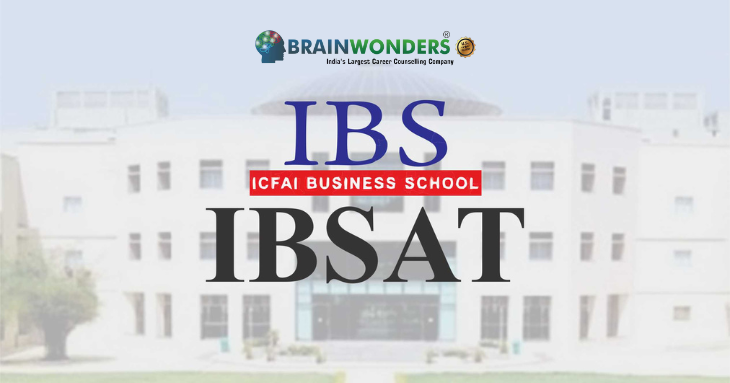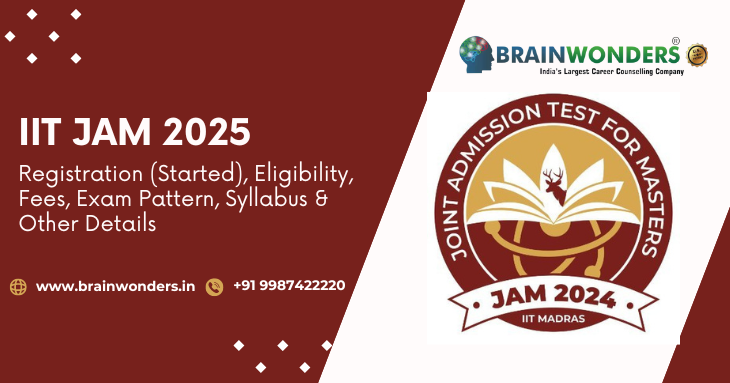

Take Brainwonders Career Test and make the right decisions for your college and course ahead
Let your unique personality, strengths, and traits guide to make the best decision of your life!
Blog
05 March,2024 | By Brainwonders

The MBA full form is “Master of Business Administration is widely recognized as one of the most sought-after post-graduate programs in India and internationally. The typical duration of an MBA course is two years, attracting candidates aspiring to build a career in management. Tailored to provide advanced skills and knowledge in various aspects of business and management, MBA courses offer an opportunity for individuals to enhance their leadership, strategic thinking, and problem-solving abilities.
To pursue MBA courses, candidates must have obtained over 50 per cent of their undergraduate degree from any discipline. Admission to MBA programs is contingent upon performance in MBA entrance exams, followed by a personality assessment test, which may include Group Discussion (GD), Written Ability Test (WAT), and Personal Interview (PI). Prominent entrance exams for MBA include CAT, CMAT, XAT, MAH MBA CET, among others. Noteworthy institutions for MBA studies in India encompass IIM Ahmedabad, IIM Bangalore, IIM Calcutta, IIM Lucknow, FMS Delhi, XLRI, ISB, and others. MBA fees typically range between INR 10 Lakh and INR 25 Lakh, varying across colleges.
Upon completing MBA courses, graduates can pursue roles such as Finance Manager, Marketing Manager, and Sales Manager. MBA qualifications have become essential for managerial-level positions across diverse domains and sectors. Consequently, many graduates from disciplines like BTech, BBA, BCom, BA, BSc, and BCA are opting for MBA Course in their post-graduation. Salaries for MBA graduates generally range between INR 5 LPA and INR 25 LPA.
The full form of MBA is Master of Business Administration. The popularity of MBA courses stems from their accessibility to students from various backgrounds, including Science, Commerce, and Humanities. A standard MBA Course typically spans two years, divided into four or six semesters. However, certain private institutes provide a one-year PGDM Course as an alternative. MBA can be pursued through various modes, including Full-Time, Part-Time, Online, and Distance Education. Interested individuals can also explore Course tailored to their professional experience, such as an Executive MBA.
Many management institutes offer Post-Graduate Diploma in Management (PGDM), Post-Graduate Diploma (PGD), or Post-Graduate Programme (PGP) in Management instead of an MBA degree. The distinction between the two is generally minimal, primarily concerning recognition. Among the education modes, a full-time MBA is the most popular, encompassing theory classes, practical projects, student exchange programs, summer internships, and final placements. Both fresh graduates and candidates with a few years of work experience opt for a full-time MBA, with some colleges prioritizing one group over the other.
Executive MBA, designed for candidates with 5-plus years of work experience, aims to enhance managerial and leadership skills to ensure relevance in the job market. Online MBA, Part-Time MBA, and Distance MBA programs cater to individuals who wish to pursue education while concurrently working.
Throughout MBA degree Course, students explore fundamental subjects like Finance, Marketing, Operations, Human Resources, and Entrepreneurship. These MBA subjects are delivered through a combination of classroom lectures, case studies, group projects, and experiential learning. The curriculum typically spans a broad spectrum, encompassing business ethics, organizational behaviour, economics, data analysis, and decision-making.
Within MBA courses, candidates have the chance to specialize in specific fields such as finance, marketing, or international business, aligning with their interests and career aspirations. Many MBA programs incorporate internships, exchange initiatives, and networking opportunities to enrich students' practical learning experiences and exposure to the industry.
MBA courses are intensive and demanding, equipping individuals for senior management and leadership roles in the business world.
The MBA is a two-year postgraduate Course that opens up extensive career prospects upon completion. This degree equips students for leadership positions in the business sector and provides opportunities for employment across diverse industries. The table below outlines the details of the MBA course:
| MBA Highlight | |
| Types of Courses | Full-Time MBA, Part-Time MBA, Distance MBA, Online MBA, Executive MBA and Integrated MBA |
| Eligibility | Graduation with 50% |
| Entrance Exam | CAT, MAT, CMAT, SNAP, XAT etc. |
| Duration | 2 Years |
| Top College | IIM Ahmedabad, IIM Bangalore, IIM Calcutta, IIM Luckmow, etc. |
| Particulars | MBA Course Details |
| MBA Full Form | Master of Business Administration |
| Course Level | Post Graduation |
| Types of MBA | Full-Time MBA, Part-Time MBA, Distance MBA, Online MBA, Executive MBA and Integrated MBA |
| MBA Fees | INR 2 Lakh - INR 27 Lakh and above |
| Eligibility Criteria | Undergraduate Degree Programme |
| MBA Admission Process | Entrance Exam + Group Discussion + Personal Interview |
| Top MBA Entrance Exams | CAT, CMAT, XAT, MAH MBA CET, etc |
| Exam Type | Semeste |
| Top MBA Colleges | IIM Ahmedabad, IIM Bangalore, IIM Calcutta, IIM Lucknow, IIM Indore, IIM Kozhikode, etc. |
| Top MBA Specialisations | Sales, Marketing, Operations, Finance, Human Resources, Digital Marketing and Business Analytics |
| Job Profiles | Finance Manager, Marketing Manager, Sales Manager, Human Resources Manager, etc. |
| Average Salary | INR 5 LPA - INR 25 LPA |
| Top Recruiters | Boston Consulting Group, McKinsey, Bain & Co, Morgan Stanley, Citibank, JP Morgan Chase, Amazon, Facebook, Google, Adobe, etc. |
Promising Career: The most straightforward way to advance your career is by obtaining a Master of Business Administration (MBA). Students focus on the employment opportunities that follow earning an MBA, recognizing the increasing significance of managerial abilities and expertise in an ever-competitive global landscape.
Develops Management Skills: Various MBA specializations empower students to concentrate on specific areas of business management, each aiding in shaping a career within that particular industry.
High Salary: Almost all students experience a salary increase upon completing an MBA course. Placement opportunities provided by colleges allow students to choose from their preferred companies. Depending on the institution, the average MBA salary ranges between INR 7,00,000 and INR 9,00,000, though in some instances, it can reach INR 15,00,000 to INR 20,00,000.
Entrepreneurship Abilities: Students gain insights into running a business, proving particularly beneficial for those with family enterprises. This course contributes to improved operational efficiency and enhanced returns for the business.
MBA programs come in diverse modes and formats. While the conventional two-year Full-Time MBA has been the favoured option for management aspirants, Executive MBA and Online MBA have seen a significant surge in popularity in recent years due to their flexibility.
| Courses | Details |
| Full-Time MBA |
|
| Part-Time MBA |
|
| Distance MBA |
|
| Online MBA |
|
| Executive MBA |
|
| 5-year-Integrated MBA |
|
| Course Type | Eligibility Criteria |
| Full-time MBA courses |
|
| Distance MBA courses |
|
| Online MBA courses |
|
| Executive MBA courses |
|
Anticipated by ambitious candidates aspiring for admission to esteemed business schools, the Top MBA Entrance Exams in India for 2023 serve as crucial gateways to secure seats in renowned MBA courses nationwide. To maximize their chances of admission, MBA aspirants should diligently prepare and strategize for these exams.
Below is the list of top MBA exams accepted by various B-schools, along with their application deadlines for the upcoming academic session:
| Entrance Exams | Exam Dates | Exam Schedule |
| NMIMS Management Aptitude Test (NMAT) | 10 Oct '23 - 19 Dec '23 | NMAT Schedule |
| Symbiosis National Aptitude Test (SNAP) | 10 Dec '23 - 10 Jan '24 | SNAP Schedule |
| Xavier Aptitude Test (XAT) | 7 Jan '24 | XAT Schedule |
| Common Admission Test (CAT) | Nov, 2024 | CAT Schedule |
| Management Aptitude Test (MAT) | Sep '24 (Tentative) | MAT Schedule |
Preparing for an MBA entrance exam is a substantial endeavour, given the high competitiveness and the significant impact these exams can have on your career and education. To assist you in effective preparation, consider the following steps:
MBA Courses Career Scope: Jobs Profiles, Salary and Top Recruiters
MBA employment can be extremely fulfilling and satisfying, especially if you are a top B-school graduate. Every industry, from marketing to tourism and healthcare, has a wide selection of MBA positions for junior, senior, and executive graduates. Depending on the candidate's specialisation, skills, and expertise, they may be able to acquire attractive employment opportunities after an MBA that provides high-income packages and other outstanding advantages.
An MBA degree holder gets jobs that include being a team lead and managerial manager of a department. A manager's job profile broadly includes:
The chosen MBA specialisation largely influences MBA salaries. Finance, marketing, general management, business analytics, and entrepreneurship are some of the leading MBA specialisations that often result in the highest post-graduation salaries. In India, the highest-paying positions after obtaining an MBA can vary from INR 5 to 30 LPA.
| Job Profiles | Description | Average Salary (in INR) |
| Business Analyst | A Business Analyst is a professional who works within an organization to analyze, understand, and document the business processes and systems. | 9.5 LPA |
| Investment Banker | An Investment Banker is a finance professional who works within an investment bank or a financial institution, specializing in providing financial advisory services and raising capital for corporations, governments, and other entities. | 5 LPA |
| Chief Financial Officer | The CFO is a high-level executive responsible for managing an organization's financial actions, strategies, and operations. | 47.1 LPA |
| Product Manager | A Product Manager is a professional responsible for overseeing the development, strategy, and success of a product throughout its lifecycle. | 24.7 LPA |
| Management Consulting | Management consulting involves providing advisory services to organizations to improve their performance, solve problems, and achieve their goals. | 7 LPA |
| Asset Manager | An Asset Manager is a financial professional or entity responsible for managing investments and assets on behalf of clients, which can include individuals, institutions, or corporations. | 6.3 LPA |
| HR Manager | An HR Manager, or Human Resources Manager, is a professional responsible for overseeing the human resources department within an organization. | 12 LPA |
| Project Manager | A Project Manager is a professional responsible for planning, executing, and overseeing projects within an organization. | 19.1 LPA |
| Sales Manager | A Sales Manager is a professional responsible for leading and managing a team of sales representatives or a sales department within an organization. | 6.7 LPA |
| Marketing Manager | A Marketing Manager is a professional responsible for planning, executing, and overseeing marketing strategies and campaigns to promote a company's products, services, or brand. | 12.5 LPA |
| Operations Manager | An Operations Manager is a key leadership role within an organization responsible for overseeing and managing the day-to-day operations and processes. | 10.4 LPA |
Upon completing MBA programs, individuals encounter diverse opportunities for advancing their education and furthering their career development. A course or program selection is primarily influenced by one's career objectives and areas of interest.
Here are some well-received courses and options accessible after completing MBA programs:
If you're unsure if a Master in Business Administration is the right choice for you, let our team of expert counsellors at Brainwonders help you find the perfect career path. We understand that making such an important decision can be confusing, which is why we offer comprehensive assessments and personalised advice to ensure we provide you with the best possible direction and opportunity. With our assistance, you'll gain clarity on your future prospects and unlock the potential to achieve your long-term ambitions. Choosing the right career stream is crucial to a fulfilling and prosperous future.
FAQs Related to the MBA Course
Q1. What is MBA?
Ans: The Master of Business Administration (MBA) is a postgraduate degree program accessible to those who have completed their undergraduate studies. To be eligible, students must have a bachelor's degree with a minimum of 50 per cent aggregate marks. In recent years, the demand for MBA courses has surged, leading to the establishment of more management colleges. Prospective students enrolling in this program must take national and state-level entrance exams such as CAT, XAT, NMAT, MAT, SNAP, and CMAT.
CAT stands out as the most popular entrance test, attracting over 2 lakh students annually, as it offers admission to prestigious institutes like the Indian Institute of Technology (IIT) and the Indian Institute of Management (IIM). CAT registration is set to commence in the first week of August.
The MBA course provides various specialisations such as Finance, Human Resources, Retail, Sales and Marketing, Entrepreneurship, etc., allowing students to choose based on their areas of interest.
Q2. What is a qualification for an MBA?
Ans: The eligibility requirement for an MBA is a graduation degree. Nevertheless, numerous colleges specify a minimum aggregate marks criterion for graduation (typically 50 per cent for General and 45 per cent for SC/ST candidates) or an equivalent qualification from a recognised university. Prospective students must take entrance exams such as CAT, MAT, XAT, NMAT, and CMAT, securing a valid score to qualify for reputable management colleges. Additionally, they must successfully pass Group Discussions/Personal Interviews (GD/PI) to reserve a seat. Afterwards, they can choose the college of their preference and complete the admission process.
Q3. Which MBA course is the best?
Ans: Every MBA course or specialisation holds promising opportunities for students in the field of business management. However, determining the best MBA course solely depends on the candidates and their interests. Some of the top MBA courses in India include Sales & Marketing, Operations, HR, Finance, and Information Technology. Upon completion of the MBA program, students will gain a comprehensive understanding of the interactions among various business verticals and develop effective communication skills to engage with individuals from diverse backgrounds.
Q4. What is the difference between MBA and a PGDM?
The main subjects in MBA and PGDM are almost the same, including topics like Human Resource Management, Financial Management, Business Economics and Communication skills. The main differences between MBA and a PGDM are:
| Points of Difference | MBA | PGDM |
| Full form | Master of Business Administration | Post Graduate Diploma in Management |
| Course Level | Degree | Diploma |
| Eligiblity | Bachelor's degree with 50 per cent marks | Bachelor degree in any discipline |
| Accredition | University Grants Commission (UGC) | All India Council for Techncial Education (AICTE) |
Q5. Can I pursue MBA through correspondence?
Ans: Yes, numerous universities such as IGNOU, Annamalai University, and Osmania University provide MBA programs through correspondence (distance education mode). Additionally, various private universities offer online MBA courses, providing students with the flexibility to enrol in them. The completion duration for MBA Distance Education typically ranges from 2 to 5 years.
Distance MBA programs gained popularity post the pandemic, with students finding it a highly advantageous instructional method. This approach enables individuals to pursue their studies concurrently with their professional commitments, offering convenience and flexibility. Read More: Advantages of Online MBA.
Take Brainwonders Career Test and make the right decisions for your college and course ahead



,_Syllabus,_Pattern,_Old_Question_Papers.png)

